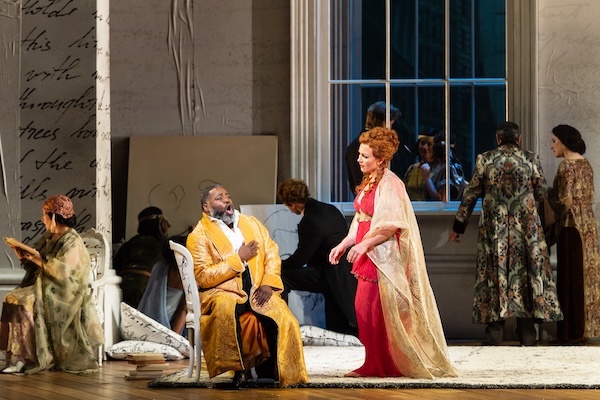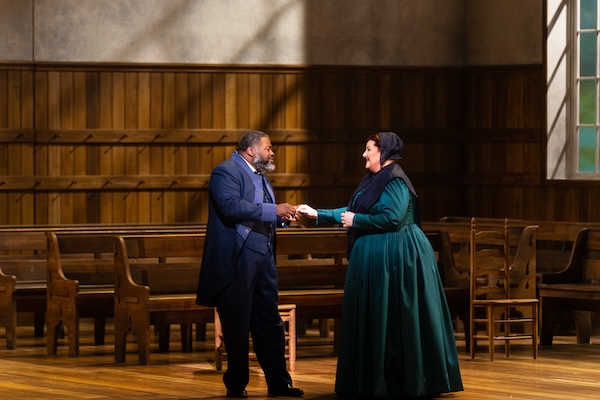HGO brings big Wagner voices and a revisionist staging to Tannhäuser

Even with hefty Wagnerian voices, it’s possible to have too much of a good thing. That situation crops up rarely, Lord knows, but it just has in Houston Grand Opera’s production of Wagner’s Tannhäuser.
Tenor Russell Thomas boasts one of the most robust, gleaming voices around. He was the linchpin of Wagner’s Parsifal for HGO last year, and he returned to Wortham Theater Center on Friday as the hero—or anti-hero—of Tannhäuser, in a staging that director Francesca Zambello transplants to early 20th-century America.
Even though 1900 isn’t exactly immediate to us nowadays, Zambello’s moving the time period from the Middle Ages to there had some benefits.
Venus is a New York City plutocrat hosting an artsy salon, complete with a composer off to one side decked out in a soft cap a la Wagner himself.
The posh aura, rendered in stylized form by set designer Peter J. Davison and costume designer Constance Hoffman, made for a powerful contrast with the world of Elisabeth, Wolfram and company. They were austerely costumed down the lines like the Amish, with the song contest took place in a simple but imposing hall resembling a Quaker meeting house.
Zambello shaped the action vividly, from the uproar at the song contest to small, telling moments—such as when Wolfram, huddling with Tannhäuser in the last scene, jumped back from him on realizing he was still condemned.
At the close, Tannhäuser was alive, arms reaching toward heaven as the curtain fell. That diverged from Wagner’s scenario, but it worked, making Tannhäuser’s redemption more meaningful.
In HGO’s first Tannhäuser since 2001, the company fielded a cast that brought Wagner intensity and eloquence—with Thomas leaning much more on the former.
The curtain rises on Tannhäuser as Wagner’s minstrel suffers a spiritual crisis: He’s torn between the otherworldly delights he has enjoyed with Venus, goddess of love, and the human-scale joys and sorrows of the earthly life he left behind.
Thomas’ ringing tones put over Tannhäuser’s agitation practically from his first words, and his voice gained in brilliance as the scene unfolded. The tenor flung out Tannhäuser’s odes to Venus—and his ensuing pleas for her to release him—with fever-pitch intensity. By the time mezzo-soprano Sasha Cooke as Venus matched his full-throated abandon in the scene’s climax, the two generated the kind of electricity more often associated with Italian verismo than Wagner.
When Tannhäuser reunited with his beloved Elisabeth, Thomas occasionally turned to gentler shadings. But those kind of subtle moments from him were few.
In Act 2’s song contest, Thomas again swept through Tannhäuser’s hymns to Venus with trumpet-tone vigor. And after the crowd’s condemnation triggered the return of the minstrel’s spiritual turmoil, Thomas hurled out his repeated cries for heaven’s mercy with clarion forcefulness. Thomas brought impressive stamina to a scene that’s notoriously high, but because so much of his singing sounded the same, the dramatic impact waned.
Only in the last scene’s Rome narrative, as the weary Tannhäuser described his fruitless pilgrimage for the pope’s forgiveness, did Thomas bring Wagner more expression. His heavier, more muted tones drove home Tannhäuser’s ruefulness and frustration. And the occasional snarl put over the minstrel’s visceral reaction to the pope’s scorn.

As Elisabeth, Tamara Wilson brought Wagner a power of her own—no surprise from the soprano whose voice rang out as Puccini’s Turandot for HGO in 2022—plus a wealth of shading and expression.
Even as she warmed up in Elisabeth’s entrance aria, “Dich, teure Halle,” Wilson tossed off its upward leaps with a gusto that ignited Elisabeth’s words about her heart leaping with joy at Tannhäuser’s return. Then Wilson’s voice turned hushed and introspective as she spun out the forlorn melody describing Elizabeth’s sadness when Tannhäuser left her.
Wilson brought every scene that kind of richness. Amid the melee that followed Tannhäuser’s scandalous contribution to the song contest, Wilson’s cry of “Away from him!” was so commanding and vibrant that it was no wonder everyone froze. And Wilson treated Elisabeth’s Act 3 prayer to still more pure, tender lyricism, punctuated by a few groundswells of tone that conveyed Elisabeth’s zeal.
As Venus, Cooke delivered generous doses of the vocal wallop she contributed to HGO’s 2022 revival of Ethel Smyth’s The Wreckers. She easily matched Thomas’ intensity. But if both had woven in softer touches more generously—especially, in Cooke’s case, when Venus tried to cajole Tannhäuser into staying with her—their scene’s overall trajectory would have been more potent.
As Tannhäuser’s fellow minstrel Wolfram, baritone Luke Sutliff came into his own in Act 3. He brought poise and gravity to Wolfram’s description of Elisabeth’s suffering, then sang the famous “Song to the Evening Star” in flowing, serene phrases.
Among the other minstrels, bass Cory McGree stood out thanks to the gusto he put into Biterolf’s contribution to the song contest.
As Landgraf Hermann, Elisabeth’s uncle, bass Alexandros Stavrakakis lent a kindly aura to his moments with Elisabeth, thanks to his mellow tones. But he summoned heft enough to hand down Tannhäuser’s banishment at the end of the song contest.
The HGO Orchestra and HGO Chorus, conducted by Erik Nielsen, contributed powerfully to Wagner’s storytelling—as contained in his Dresden version of the opera, not Wagner’s revision for Paris.
In the Overture, the orchestra sang out the Pilgrim’s Chorus theme with warmth and fullness, then took off zestily in the gymnastics based on Tannhäuser’s hymn to Venus.
Nielsen gave the “Entrance of the Guests” a light, cheery tread, and throughout the opera, he was especially adroit in dovetailing the orchestra with Wilson’s lyrical finesse. The orchestra’s strings glowed in some of the score’s most expressive moments, and the cellos welled up richly alongside Sutliff in the “Song to the Evening Star.”
Wagner makes the chorus practically a character unto itself, and HGO’s group—especially the men—sang with such polish and purity in the quieter moments that those were as telling in their way as the most sonorous spots.
Tannhäuser runs through May 11 at Wortham Theater Center. houstongrandopera.org

